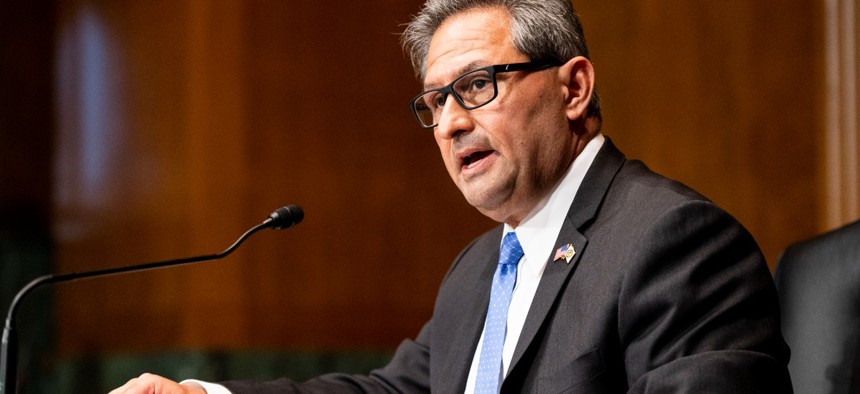
Michael Carvajal, director of the Federal Bureau of Prisons, said understaffing is not as widespread as it might seem. Bill Clark/CQ-Roll Call Inc. via Getty Images
Bureau Director To Congress: Federal Prisons Are Not As Badly Understaffed As People Think
Vacancies are concentrated in a small number of locations and will be addressed partly through recruitment incentives, director testifies during a House hearing.
The outgoing head of the federal prisons agency on Thursday pushed back on the “common criticism” that the agency is chronically understaffed.
Michael Carvajal, director of the Federal Bureau of Prisons, testified before the House Judiciary Committee’s Crime, Terrorism and Homeland Security panel that while the agency does have gaps in staffing, they are concentrated in a small number of locations.
“The bureau's work is incredibly challenging and [those challenges have] been exacerbated by the COVID-19 virus.” said Carvajal, who recently announced that he will retire once a replacement is found. A “common criticism is that we are understaffed,” he added. But he noted that there are about 1,100 correctional officer vacancies and seven of the bureau’s 121 locations account for 40% of the vacancies.
“Last calendar year we hired over 3,000 staff and, at one point, advance hired 1,000 staff above our funding levels,” said the director. “We have proven that we can hire employees and although hiring is not an issue at the majority of our locations, we are routinely outbid by competing state and local corrections or law enforcement agencies who pay a higher wage.” Therefore, the bureau is working with the Justice Department on how it can use additional incentives to make its hiring more competitive.
These incentives are for recruitment, retention and relocation, he said in response to a question from Rep. Val Demings, D-Fla. He noted that the Office of Personnel Management sets the pay bands for the various locations.
One of the BOP locations that is particularly hard to staff is Beaumont, Texas, because of the competition from local industry in the area. That is where an incident took place on Monday that led to a nationwide lockdown of facilities.
Staffing at the agency has been a major concern among lawmakers from both major political parties and union representatives, who have repeatedly said the agency is chronically understaffed. The bureau’s reliance on overtime and its use of augmentation—a practice where nurses, teachers or others serve as correctional officers—are also areas of concern.
Carvajal said “all of our staff are correctional trained,” which “gives us the ability to utilize these staff safely,” in response to a question from Demings on safety for employees while on the job.
As for the ongoing coronavirus pandemic, “our management of the pandemic has been highly scrutinized despite the fact that we have worked in lockstep with the [Centers for Disease Control and Prevention] in shaping the guidance for the benefit of everyone who works in the corrections environment,” Carvajal said. “Approximately 80% of our staff and 70% of our inmates have been fully vaccinated. And we continue to increase those rates.”
While the vaccine mandate for federal employees is currently halted, the agency is still encouraging vaccinations. Carvajal said he believed some employees were fired for not complying with the mandate before the injunction, but would have to follow up on the exact numbers.
Rep. Thomas Massie, R-Ky., said that as of January 20, there had been 4,738 exemptions granted from the vaccine mandate, most of which were for religious reasons, according to data he requested from BOP. Documentation provided to Government Executive from Massie’s office says that 4,495 were for religious purposes and 243 were medical.
Rep. Tom Tiffany, R-Wis., asked if employees who were fired for non-compliance with the mandate could be rehired. “We have processes for all that and I’m certain we will follow them,” Carvajal replied. They will be “following OPM guidance, regulations, and all the rules and laws.”
The Justice Department issued a legal opinion in December saying that federal inmates put on home confinement due to the pandemic can stay, reversing the policy issued shortly before the Trump administration left office. Carvajal said the bureau will “be as transparent as possible” on carrying that out.
On the national lockdown, instituted on Monday, Carvajal said it was a “serious” decision and he hopes it will be “short-lived.” He didn’t go into specifics of operations.
Rep. Randy Weber, R-Texas, who is a member of the bipartisan BOP Reform Caucus, said in a statement on Tuesday he was “deeply troubled” by the deaths in a facility in Beaumont, Texas that precipitated the lockdown. He, along with Reps. Clay Higgins, R-La., and Brian Babin, R-Texas, sent a letter to Carvajal in September regarding staffing issues at the Beaumont location and said they haven’t received a response yet.
“If the underlying issues that plague the BOP are not addressed, I am afraid that we will continue to see instances of violence throughout the federal prison system,” Weber said. “I will continue to work with my colleagues on the BOP Reform Caucus to address these concerns, and I call on Director Carvajal to fulfill his duty as director of the BOP to take immediate action to secure our prisons and to work with Congress to solve the staffing problems.”







